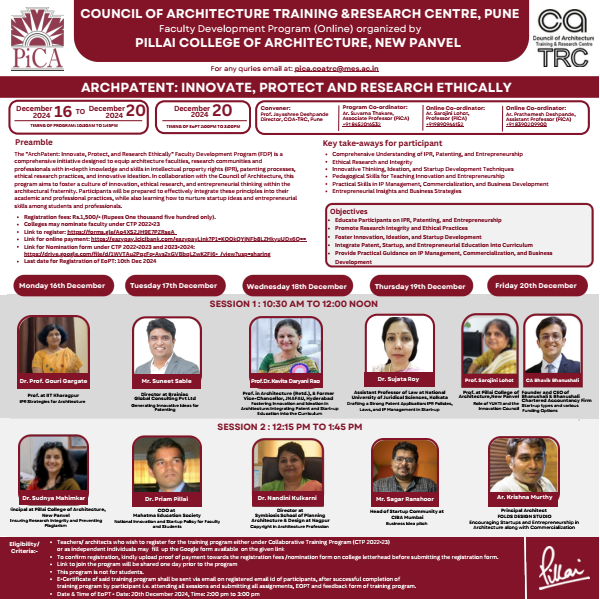Faculty Development Program on “ArchPatent: Innovate, Protect and Research Ethically”
| Subject | FDP |
| Session | I |
| Year | 2024-25 |
| Date | 16th to 20th December, 2024 |
| Time | 10:30 a.m. to 2:45 p.m. |
| Faculty | Program Cordinator: Prof. Suvarna Thakare Online Co-ordinator: Prof. Sarojini Lohot and Prathamesh Deshpande |
| Guest Speaker | Dr. Prof. Gouri Gargate, Dr. Prof. Sudnya Mahimkar, Mr. Suneet Sable, Dr. Priam Pillai, Prof. Dr. Kavita Daryani Rao, Dr. Nandini Kulkarni, Dr. Sujata Roy, Mr. Sagar Ranshoor, Prof. Sarojini Lohot, Mr. Bhavik Bhanushali and Ar. Krishna Murthy |
Pillai College of Architecture (PiCA), New Panvel, in collaboration with the Council of Architecture (COA), organized a Faculty Development Program (FDP) titled “ArchPatent: Innovate, Protect, and Research Ethically” from December 16th to 20th, 2024. The program ran daily from 10:30 a.m. to 2:45 p.m.
The FDP aimed to equip architecture faculty, researchers, and professionals with in-depth knowledge and skills in intellectual property rights (IPR), patenting processes, ethical research practices, and innovative ideation. This initiative sought to foster a culture of innovation, ethical research, and entrepreneurial thinking within the architectural field. Participants were prepared to integrate these principles into their academic and professional work, and to nurture startup ideas and entrepreneurial skills among students and professionals. Eleven guest speakers contributed to the five-day program.
The program commenced with an inaugural message from Convener Prof. Jeayshree Deshpande, Director of COA-TRC, Pune. Dr. Prof. Sudnya Mahimkar, Principal of PiCA, then presented an overview of the college’s research and innovation culture, highlighting available infrastructure, plagiarism policies, and introducing the Program Coordinators. Following this, Prof. Suvarna Thakare welcomed the guest speakers and faculty participants, and introduced the Online Coordinators for the program.
Day 1: Session 1
Dr. Prof. Gouri Gargate, Prof at IIT Kharagpur delivered a lecture on IPR Strategies. According to Dr. Prof Gouri Gargate, IPR are indispensable in knowledge economy. This session was focused on 8 types of IP with their relevance in domain of architecture. Various strategies for IP Management will be disused in depth.
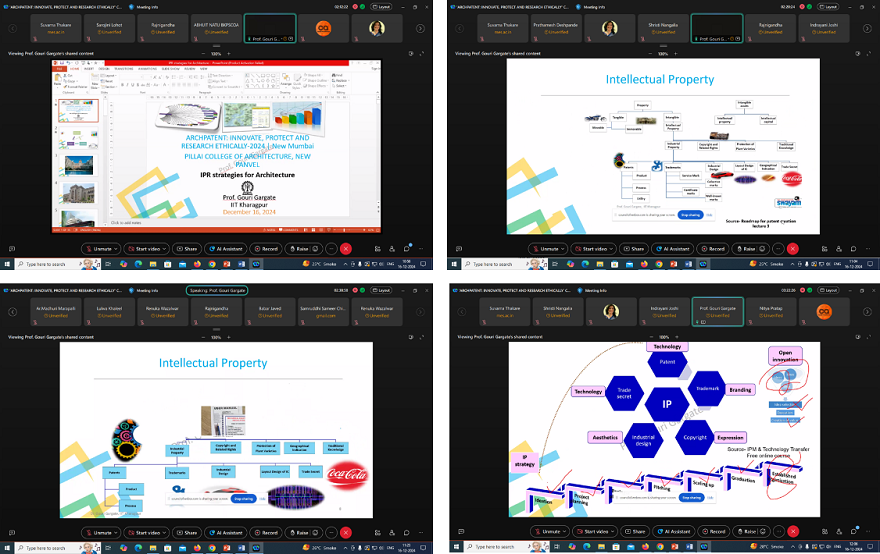
Day 1: Session 2:
Dr. Prof. Sudnya Mahimkar, Principal at Pillai College of Architecture, New Panvel delivered a lecture on Ensuring Research Integrity and Preventing Plagiarism. The session was focused on explored the key concepts, types, and implications of plagiarism alongside the role of Intellectual Property Rights (IPR) in protecting originality. It examined various forms of plagiarism, including direct plagiarism, mosaic plagiarism, paraphrasing plagiarism, and self-plagiarism, while emphasizing the importance of academic integrity and originality in research and creative works.
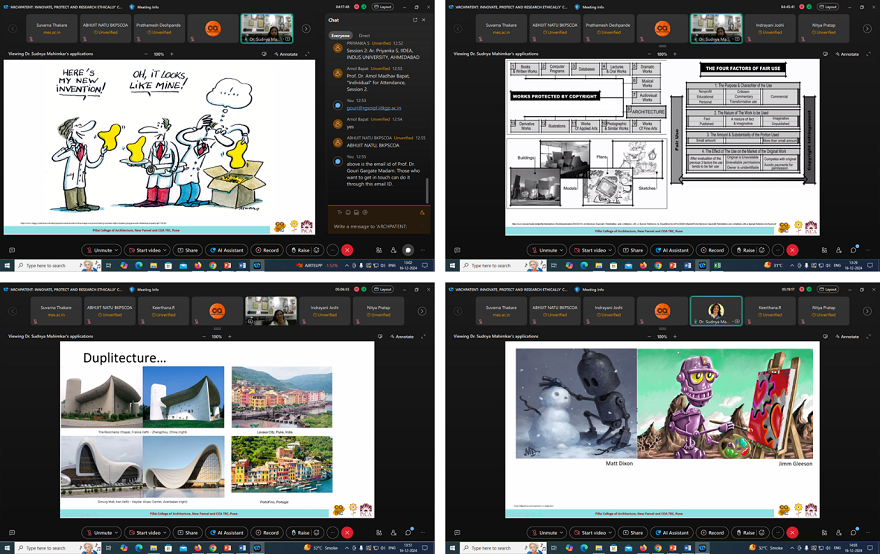
Day 2: Session 1:
Mr. Suneet Sable, Director at Brainiac Global Consulting Pvt Ltd, delivered a lecture on Generating Innovative Ideas for Patenting. His presentation focused on strategies for architects to generate innovative ideas and effectively protect them through patents and design registration. It covered patentable innovations such as sustainable materials, smart technologies, modular construction, and 3D printing, while highlighting real-world case studies and failures, including those of Nokia and Kodak. Techniques such as TRIZ, brainstorming, SCAMPER, and AI tools were introduced to help identify problems, develop solutions, and validate ideas. Practical methods for conducting patentability searches and protecting intellectual property were also discussed, ensuring that architects are well-equipped to thrive in innovation-driven markets.
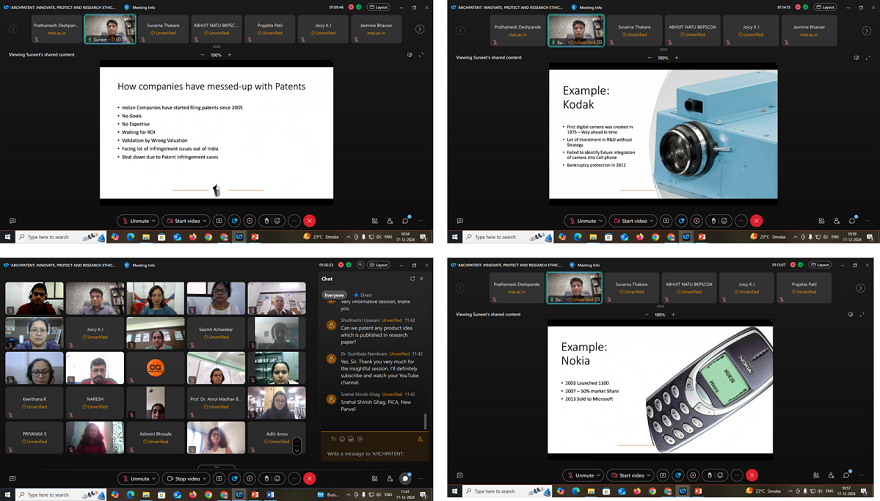
Day 2: Session 2:
Dr. Priam Pillai, COO at Mahatma Education Society, delivered a lecture on National Innovation and Startup Policy for Faculty and Students. His presentation was focused on fostering an entrepreneurial ecosystem within academic institutions by integrating innovation, research, and startup culture into the education system. The policy encouraged faculty and students to engage in entrepreneurial activities by providing structured support, including access to funding, incubation centers, mentorship, and skill development programs.
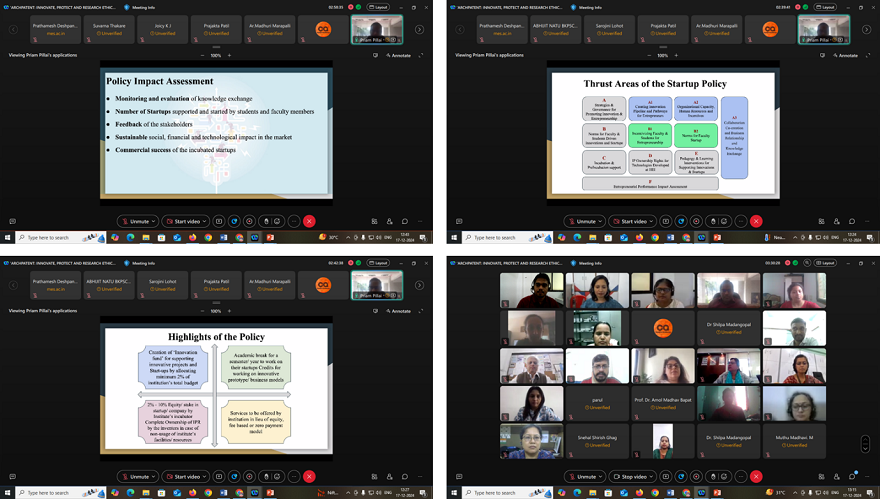
Day 3: Session 1:
Prof. Dr. Kavita Daryani Rao, Prof. in Architecture (Retd.), & Former Vice-Chancellor, JNAFAU, Hyderabad delivered a lecture on Fostering Innovation and Ideation in Architecture: Integrating Patent and Start-up Education into the Curriculum. Her Presentation emphasized the importance of distinguishing between design and innovation in architecture, focusing on clarity in defining research, design, and innovation. It highlighted the need for a problem-solving approach to innovation rather than pursuing novelty. Key strategies included sensitizing students to areas of innovation, adopting user-centered approaches, and fostering collaboration with stakeholders such as professionals and entrepreneurs. Hackathons and institutional innovation cells were proposed as effective methods to nurture creativity. Examples of innovative architectural practices were discussed, emphasizing uniquely Indian solutions, the integration of craft, and the concept of “Living Labs” for ongoing experimentation.
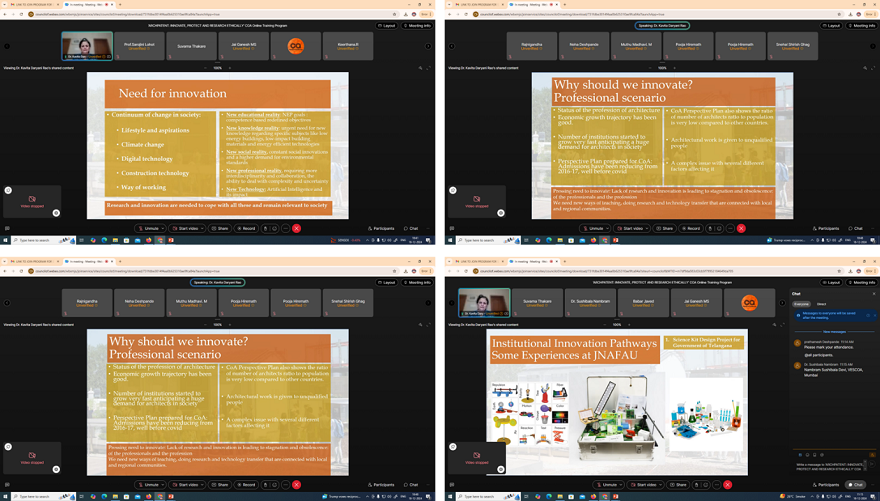
Day 3: Session 2:
Dr. Nandini Kulkarni, Director at Symbiosis School of Planning Architecture & Design at Nagpur, delivered a lecture on Copyright in Architecture Profession. This session explored a comprehensive understanding of IPR, patenting, and their intersection with architectural practice. It underscored the significance of copyright within the profession, emphasizing its role in protecting the intellectual contributions of architects. The Copyright Act of 1957 was discussed as a cornerstone for safeguarding architectural works in India, ensuring legal recognition and protection for original designs. Additionally, the Architectural Designs and Trademarks Act, 1999, was presented as providing an additional layer of security for creators, enabling architects to build a distinct professional identity. The presentation also delved into the e-filing process for patents in India, offering insights into its accessibility and systematic structure to streamline applications. It emphasized the importance of equipping architects with the knowledge and tools required to navigate IPR frameworks effectively, encouraging entrepreneurship and fostering an environment of creative excellence. By addressing these dimensions, the session underscored the need for awareness and proactive engagement with IPR mechanisms to elevate the standards of the architectural profession and enhance its global competitiveness.
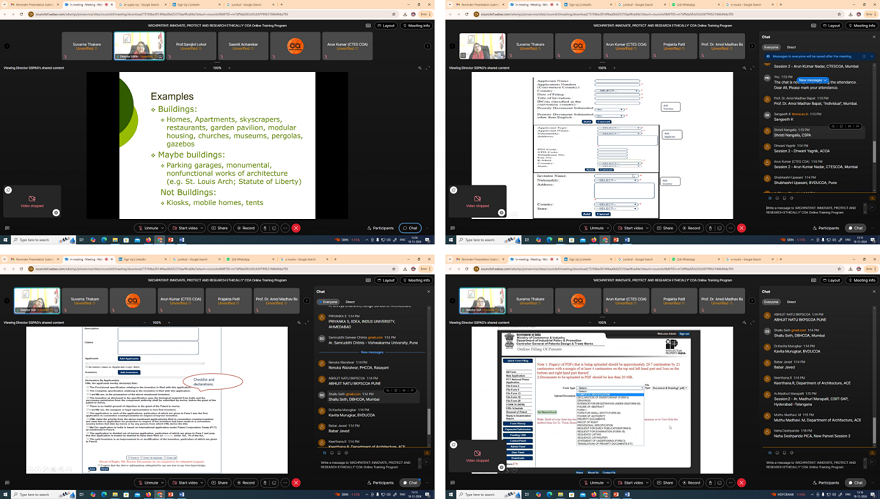
Day 4: Session 1:
Dr. Sujata Roy, Assistant Professor of Law at National University of Juridical Sciences, Kolkata delivered a lecture on Drafting a Strong Patent Application: IPR Policies, Laws, and IP Management in Start-up. Dr. Sujata Roy’s presentation provided a comprehensive guide for entrepreneurs and startup founders on protecting intellectual property (IP), with a focus on drafting strong patent applications.
The session explored the foundational principles of patent laws in India, the nuances of creating a compelling and defendable patent application, and the role of government IPR policies in supporting startups. Key topics included drafting skills, conducting prior art searches, and meeting patentability criteria such as novelty, non-obviousness, and industrial application. Dr. Roy also highlighted strategies for effective IP management in startups, addressing legal challenges, protecting patents, and enhancing the commercial value of intellectual assets. By the end of the presentation, participants gained practical insights into navigating India’s patent laws and leveraging IP for innovation and competitive advantage.
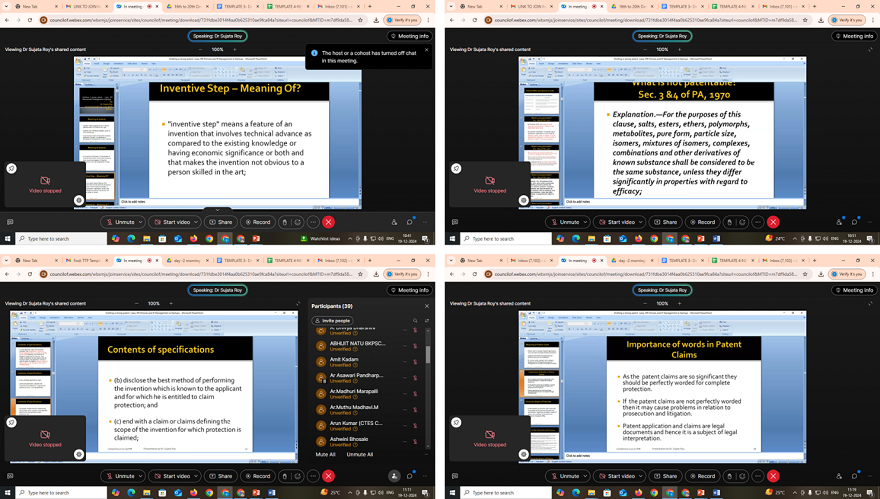
Day 4: Session 2:
Mr. Sagar Ranshoor, Head of Startup Community at CIBA Mumbai, delivered a lecture on Business Idea pitch. His talk was focused on equipping entrepreneurs with the essential skills to effectively present their business ideas to potential investors and stakeholders. He discussed the critical elements of a successful idea pitch and emphasized articulating what makes the business unique and valuable, ensuring that entrepreneurs could clearly communicate their competitive advantage. The session included tips on using visuals effectively to enhance understanding and retention of key points, providing participants with practical strategies to make their pitches more impactful.
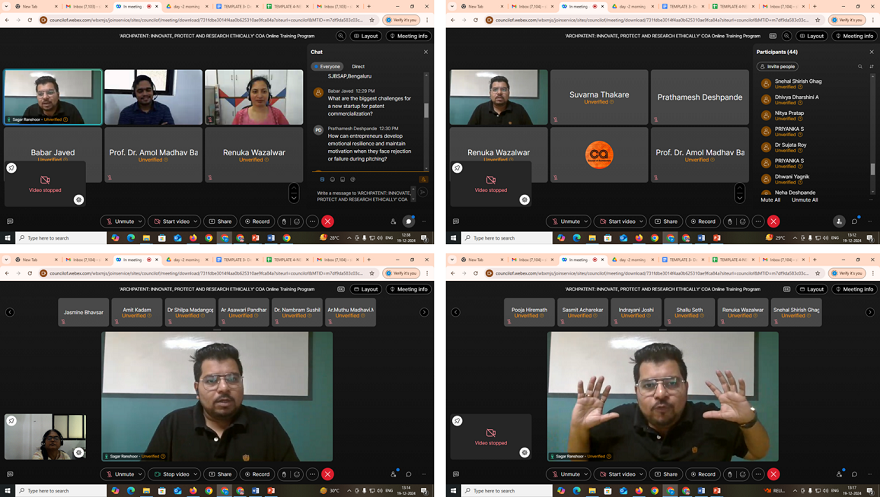
Day 5: Session 1:
Prof. Sarojini Lohot, Prof. at Pillai College of Architecture,New Panve, delivered a lecture on Role of YUKTI and the Innovation Council. The presentation explored the Yukti Portal, a digital initiative by the Ministry of Education, and its critical role in supporting the Indian Institutional Innovation Council (IIC). The portal fostered innovation, collaboration, and resource-sharing among academic institutions, researchers, and industries.
It featured an innovation dashboard, startup registry, and tools for public-private partnerships, empowering grassroots innovation and entrepreneurship. By acting as a data repository, it aided the IIC in resource allocation, policymaking, and performance benchmarking. The presentation highlighted best practices initiated to encourage students toward innovation and startups.

Day 5: Session 2:
Mr. Bhavik Bhanushali, Founder and CEO of Bhanushali & Bhanushali Chartered Accountancy Firm, talked on Start-up types and various Funding Options. His Presentation delved into the foundational aspects of startups, exploring their classification based on industry focus, business stages, and funding strategies. Key topics included: Startup Types: An overview of startups categorized by industry domains (technology, healthcare, green energy, etc.) and their developmental stages (early-stage, growth-stage, and established businesses).
This presentation offered valuable guidance to aspiring entrepreneurs and stakeholders, equipping them with knowledge to make informed decisions and drive their ventures toward sustainable growth.
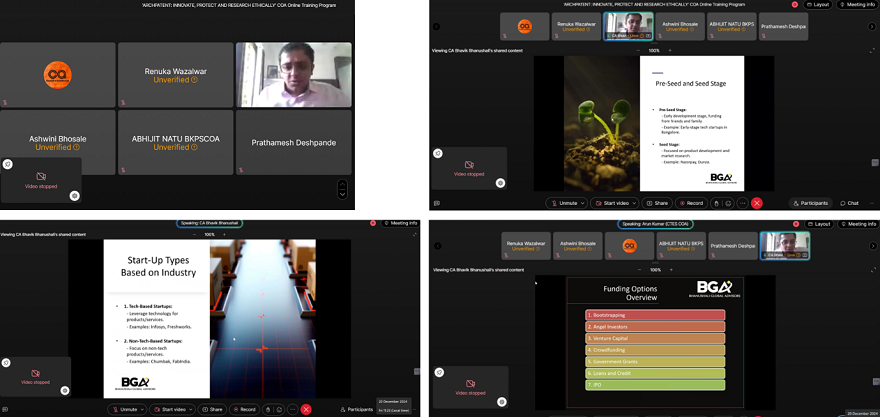
Day 5: Session 3:
Ar. Krishna Murthy, Principal Architect FOLDS DESIGN STUDIO, delivered a lecture on Encouraging Startups and Entrepreneurship in Architecture along with Commercialization. His talk highlighted his experiences as an architect and how they significantly shaped his entrepreneurial strategies, reflecting a blend of design expertise and business acumen. His presentation illustrated how foundational architectural skills were leveraged in the entrepreneurial landscape.
He explored the integration of technology and the use of digital tools, which not only enhanced design accuracy but also improved operational efficiency in his business endeavors. The focus was on automation and machinery, emphasizing the role of machines in construction to increase productivity while maintaining high standards of quality.
Additionally, he discussed the incorporation of sustainability into the core of his business model, ensuring ecological integrity and social equity. Waste utilization was a key theme, where he showcased the use of fly ash, a by-product of coal combustion from power plants, in brick production, transforming this hazardous waste into a valuable resource.
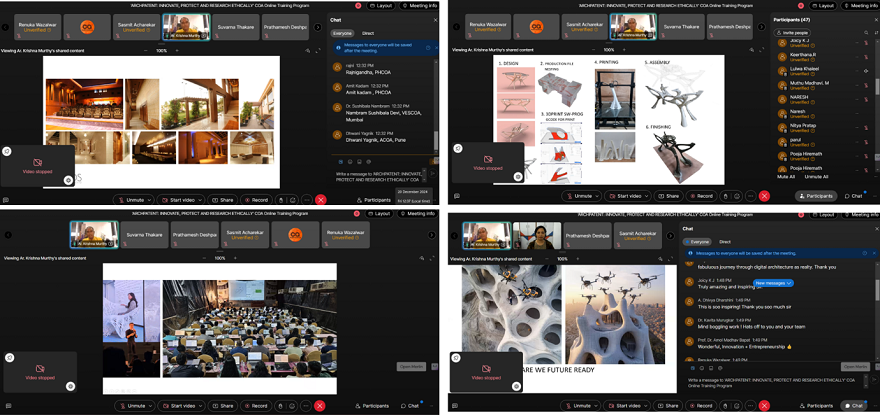
AThe 5 day online faculty development program ended with the vote of thanks and EOPT for that link was shared by COA which need to complete by all the faculty participants to receive the program certification.
Key take-away for participants
- Comprehensive Understanding of IPR, Patenting, and Entrepreneurship
- Ethical Research and Integrity
- Innovative Thinking, Ideation, and Startup Development Techniques
- Pedagogical Skills for Teaching Innovation and Entrepreneurship
- Practical Skills in IP Management, Commercialization, and Business Development
- Entrepreneurial Insights and Business Strategies
Social Media Link of the event:
![]()
